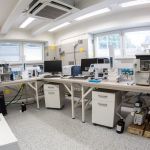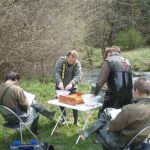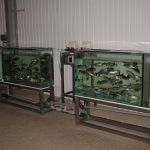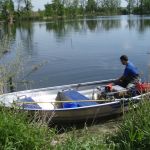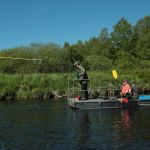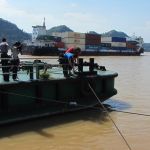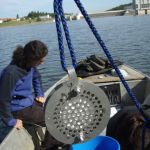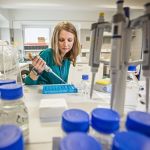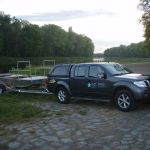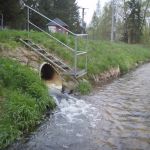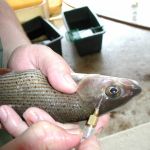
Research Institute of fish Culture and Hydrobiology /RIFCH/
About Laboratory of Environmental Chemistry and Biochemistry
Activity of the laboratory
The laboratory activity is focused on occurrence of xenobiotic substances in water ecosystems and investigation of their impact on exposed organisms. Wild and farm fish contamination is also a concern. The lab is currently turning attention towards monitoring of contamination using passive sampling methods. Laboratory scale toxicological studies belong to important part of experimental activities as well as field sampling of water and fish. Experiments are mainly focused on impact assessment of selected chemical compounds (currently especially pharmaceuticals and pesticides) on model organisms. Effect of xenobiotic substances present in the aquatic environment on fish is studied especially by means of determination of selected biochemical parameters (so-called biochemical markers of contamination) in fish tissues. The laboratory is equipped with state of art instruments for trace analyses e.g. LC/LC-HRMS, LC/LC-MS/MS and GC-MS/MS. Some of the chemical analyses are performed in cooperation with specialized analytical laboratories from other institutes both home and abroad (Umea University, SLU Uppsala, Institute of Chemical Technology in Prague, National Veterinary Institute in Prague, University of Veterinary and Pharmaceutical Sciences in Brno). The scope of analyses includes not only pollutants limited by the legislation but also new compounds belonging to family of emerging pollutants. These compounds represent a potential risk for exposed organisms according to the latest scientific information. Recently, the laboratory is focused on development of new progressive detection methods and consequent analyses of wide spectra of relevant pharmaceuticals, illicit drugs, UV filters and pesticides in the environmental samples. Semi field experiments are used for evaluation of passive sampler calibration, namely POCIS (Polar Organic Compounds Integrative Sampler).
We use above mentioned sampling and analytical methods for evaluation of traditional and newly introduced sewage and drinking water treatment technologies. We investigate possibilities for removal of biologically active substances, which were so far out of scope. Complementary, bio-monitoring system using fish as bio-indicators for continuous quality control of drinking water is under development. Within the mentioned activities we cooperate with waterworks and sewage treatment plants. The laboratory participates in the national program of water quality monitoring coordinated by Czech Hydrometeoroligal Institute (CHMI). We also cooperate with institutions and organizations engaged in environmental protection, ecological risk and contamination assessment, evaluation and policy (e.g. Czech ministry of Agriculture, Czech ministry of Environment, Police).
Trout waters management
Laboratory employees also deal with the issues of trout waters management. The laboratory participated in development of artificial breeding methods in cooperation with fishing associations. Various age categories of brown trout (Salmo trutta m. fario L.) and grayling (Thymallus thymallus L) including brood fish were tested. The goal is to increase the number of vital brood fish and provide high quality stock fish for strengthening of wild populations of brown trout and grayling. The assessment of adaptability of bred stock to open waters and comparison of ecological demands of stocked and wild individuals provide very important data for the management of our trout waters. Experimental activity is largely executed in conditions of trout farm of the Czech Fishing Association in Kaplice and in the experimental fishing ground of the USB RIFCH Vodňany. The acquired knowledge provides progressive methods of trout grounds management promoting stabilization and development of wild trout and grayling populations.
Laboratory employees participate in education of students at FFPW which are studying in bachelor, master and also postgraduate study programs as well.
1 Analytical laboratory
2 Fish population analyses
3 Biomonitoring system for raw drinking water quality control
4 Experimental pond Cezarka
5 Electrofishing in upstream part of Vltava river
6 Passive sampling on the River Yangtze China
7 Passive sampling, Rimov reservoir for drinking water
8 Samples preparation
9 Off-road car with electrofishing boat
10 Zivny stream downstream Prachatice - experimental site
11 Tagging of grayling by VIA tags
Commercial activities
The laboratory executes orders in following fields:
• assessment of contamination of selected localities (rivers, reservoirs) and assessment of contamination impact on fish
• determination of a wide range of biochemical indicators in fish tissue
• passive sampling
• chemical analyses of environmental samples
• toxicological studies focused on determination of impact of selected extraneous substances on fish executed under laboratory conditions
• biomonitoring for research purposes and for state administration
• fish haul by means of electric aggregates
• assessment of hygienic quality of fish meat
• management of trout waters
• consultancy in the area of technologies of the brown trout and grayling breeding
• administration of purpose-built fishing ground of the USB RIFCH Blanice vodňanská 4B – sale of permits
• proposals and service activities in the field of biomonitoring systems using fish as bioindicators
• consultancy and advisory activity in the field of toxicology and fish management of free waters
Staff and contacts

